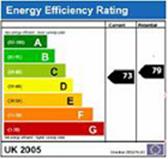Regulations affecting Landlords Letting Residential Property
There are legal obligations and responsibilities that the Landlord must be aware of. Specifically with regard to; Fire
safety for furnishings, Gas appliance safety testing, Electrical wiring, Energy performance and Deposits.
It is essential that landlords take these responsibilities seriously as failure to comply can lead to large fines and
even imprisonment. Taylor Made can advise you further as regards each of these so that you take the necessary steps to comply with the law and enjoy full peace of mind.
The Gas Safety Regulations 1998
 It is a landlord’s legal responsibility to ensure that all gas burning appliances and installations are
It is a landlord’s legal responsibility to ensure that all gas burning appliances and installations are
maintained in good order and are checked for safety at least every 12 months by a Corgi registered
Engineer. Taylor Made can organise a Gas Safety check and certification on your behalf and because
we organise so many via the same team of Engineers, we are able to secure heavily discounted
rates.
Further information and advice is available at www.trustcorgi.com/Landlords.
The Electrical Equipment (Safety) Regulations 1994
 When letting a property, you must ensure that the electrical system and all appliances supplied are
When letting a property, you must ensure that the electrical system and all appliances supplied are
safe as failure to comply with the regulations can result in fines, imprisonment and the tenant may
also be able to sue for civil damages.
There is currently no statutory requirement to have annual electrical safety checks under the Housing Act, but this
is set to change in the near future. Even so with the onus being on the Landlord to ensure safety, it is strongly
advisable to have periodic checks carried out by a qualified Electrician. In particular, Landlords are advised to
check that the earthing and insulation of all electrical circuits and appliances within the property are up to
standard.
 Equipment or wiring which is deemed to be unsafe includes defects such as:
Equipment or wiring which is deemed to be unsafe includes defects such as:
- Badly frayed or damaged insulation
- Old or exposed wires, poorly fitted or cracked plugs
- Scorch marked or badly damaged sockets
- Plugs without sleeved insulated pins
Anything which is identified as being potentially unsafe should be replaced immediately with equipment which
complies with BS and EC standards.
Taylor Made can organise an electrical safety check and certification, and because we organise so many via the same
team of Engineers, we are able to secure heavily discounted rates.
The Fire and Furnishings (Fire Safety) Regulations 1988/1993
 Ensure that furnishings carry a manufacturer’s permanent and fixed label showing compliance at the point of sale.
Ensure that furnishings carry a manufacturer’s permanent and fixed label showing compliance at the point of sale.
It is the legal responsibility of the Landlord to ensure that any furniture supplied to Tenants complies
with these regulations.
- If possible, buy new from a reputable retailer as second hand furniture is more risky.
- Keep all purchase receipts
The regulations apply to:
- Arm chairs, three piece suites, sofas, sofa beds, futons and other convertible furniture.
- Beds, Bed bases and headboards, mattresses, divans and pillows.
- Nursery furniture
- Garden furniture which could be used indoors
- Loose, stretch and fitted covers for furniture, scatter cushions, seat pads and pillows.
- Bed bases and mattresses are not required to bear a permanent label but compliance will be indicated if
the item has a label stating that it meets BS7177
The regulations do not currently apply to:
- Antique furniture or furniture manufactured before 1950
- Bed clothes and duvets
- Loose mattress covers
- Curtains
- Carpets
Any items purchased for the property after the start date of the tenancy agreement must also comply with these
Regulations for the duration of the tenancy.
The Energy Performance of Building Regulations 2007/2008

![]() It is now mandatory for all Landlords and Agents to provide Energy
It is now mandatory for all Landlords and Agents to provide Energy
Performance Certificates (EPCs) to all new prospective Tenants at
point of marketing a property To Let or renewing a tenancy on a
fixed term basis. An EPC will last for 10 years.
Energy Performance Certificates (EPC’s) became mandatory for all new tenancies whether
the tenant has occupied the property before 1st October 2008 or not.
An ‘Energy Assessor’ will be required to visit the property to ascertain information regarding its energy efficiency
and then produce a report based on this information. This report is to be made generally available but especially
to prospective tenants viewing the property.
Taylor Made can organise an EPC on your behalf and because we are organising so many via the same team of
Assessors, we are able to secure heavily discounted rates.
Tenancy Deposit Legislation 2007
With effect from 6th April 2007, legislation was passed stating that for all new tenancies after this date, Landlords and Agents must protect deposits under an approved scheme within 14 days from the commencement date of the tenancy.
The government approved scheme administered by The Deposit Protection Service is probably the most favoured option as it is easy to set-up and completely free of charge for Landlords and Agents
There are now also formal dispute procedures to follow in the event of a dispute between the Landlord and Tenant
at the end of the tenancy. More information can be found at: www.direct.gov.uk/en/TenancyDeposit
 Taylor Made recommend Alltrades (Bournemouth) Ltd for all safety testing, certification and
Taylor Made recommend Alltrades (Bournemouth) Ltd for all safety testing, certification and
property repairs.
tel: 01202 638 718 email: info@alltradesltd.com
web: www.alltradesltd.com



